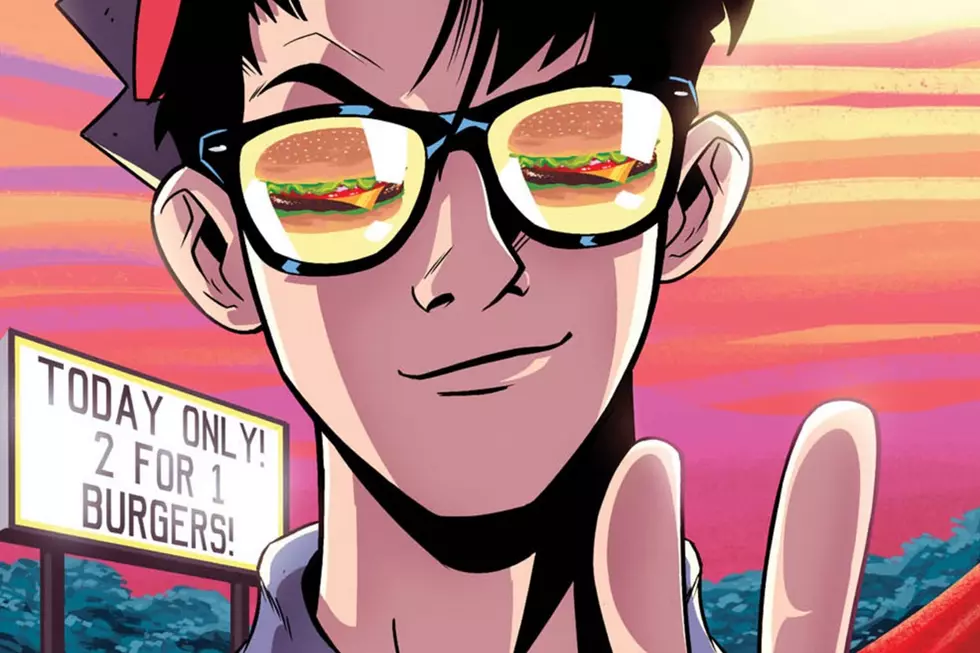
Digital Comics: Successful, Accessible, and Ruining How We Read Comics?
It's incontestable that the availability of digital comics has revolutionized the genre.
Digital comics are making entire runs of mainstream comics accessible to anyone from anywhere --- as long as they have an appropriate device. But have we really considered the effects of our transition to digital reading? Is it possible we've sold our comic soul to the technological devil, without realizing what we’ve done? Is Mephistopheles coming for the very characteristics that make comics a unique form of media?
It sounds like such an overreaction, and it might be. Digital comics are amazing. It’s impossible to ignore the benefits: they’re never sold out, and you can access them from anywhere. They’ll never get rained-on or creased or devalued, and some of them are free. You can get extras with movie tickets, or plug-in a digital code to double the accessibility of your print copy. If you’re sick, tired, unable (or unwilling) to go to the comic shop, you can still get your comics. And, just like Fifty Shades of Grey (which instantly became more popular once readers could get Kindle copies), no one has to know what you’re reading (if you're embarrassed by your choices). More people are reading comic books all the time, and their increased accessibility has a lot to do with that.
But if your six-year-old starts reading comics on her iPad, is it really like the first time you teased open a paper copy? Is a two-page splash really equivalent on the Kindle? The nostalgic feeling of joy in the physicality of a comic book is important to me, and it’s not something I can get from a digital edition. It bothers me when that physicality is gone... but what concerns me more than anything, I think, is that digital comics are ruining the genre’s complex relationship to time.
If you've read Understanding Comics, you probably remember when author Scott McCloud presented a series of text-free panels depicting a heated wrestling match. According to McCloud, we experience the panels as progressing rapidly because it takes us very little time to understand the images. By contrast, text-heavy panels require us to work, moving our eyes back and forth between the image and the narrative, and moving our brains between the comprehension of an image and the comprehension of constructed language.
Let’s break this down further, because comic time is truly different from time in every other form of media. Prose literature, for instance, is a single-format form of media, so you consume a novel at whatever rate you can process the information it represents (in other words, however fast you read). In addition, sentences only make sense in a particular order, so you have to approach the novel in a pre-determined, linear fashion.
Similarly, movies present images and sound in an order dictated by the director. Though the visual and auditory elements of film are similar to the symbiotic nature of comics, your brain can process both sound and image simultaneously, meaning that everyone can watch a ninety-minute movie in ninety minutes.
But with a physical comic book, every individual comic book reader has an individual reading experience. I linger a lot over Emma Rios’ artwork when I read Pretty Deadly, for instance. If you don’t, you probably finish reading faster than I do. Maybe you flipped backwards in Thor once you figured out the identity of the mysterious Goddess of Thunder. Or maybe you cracked open the issue while waiting in line at the comic shop, and figured out from the images where writer Jason Aaron was taking the narrative. I haven’t felt like I could “flip through” or “linger” in digital comics in the same way.
And there are other, more significant ways that physical comics distort time. When you open a physical comic to a two-page spread, you have an idea of where the action is going before you even read the dialogue, because your peripheral vision can identify images even before you mean to. As a result, comic book readers have always experienced comics two-pages at a time, reading some combination of the present (the top of the first page) and the future (the bottom of the second) simultaneously. And every time you progress to the second page (future becoming present), you continue to carry the first page (present becoming past) with you. In other words, you have access to multiple points of time at once. That’s something you can’t get from other forms of media.
Which is exactly why reading comics on the iPad is not really the same, even if we want it to be. I find it very difficult to view an entire page of a comic on my iPad, let alone two. Making the image that big makes the text too small for me to decipher. It’s why Comixology and Kindle Cloud Reader and Marvel.com (etc) all offer different forms of “Guided View” reading, which takes you panel-by-panel through your digital comic. It’s a very clever way to compensate for the limited scope of my iPad screen (and there’s something fascinating about the movement of the guided view), but it isn’t the same. Time in comics is something that progresses at a rate unique to the genre, and differs slightly for every individual reader. I just don’t believe that digital comics are currently capable of giving us that.
But maybe the pros outweigh the cons. I was recently struck by just how many ads are in a paper copy of some of the comics I read. If every other page is an advertisement, there’s very little room for two-page spreads anyway. Since Digital Editions leave out a lot of the ads, it’s possible that at this point the reader can get a more immersive experience digitally than they can in "real life." And with Marvel’s introduction of “Augmented Reality” (AR), readers interested in both the physical and digital experience can pair their physical issues with an unlocked world of digital content. It could be argued that AR is just the next evolution of comics’ complicated relationship with time, as some readers will miss out completely, while others will experience AR content simultaneously with the print edition.
Maybe I’m overreacting. Maybe I’m too worried that the evolution of the genre will mean losing what is unique about it. I can’t help feeling like we’ve signed away the soul of the comic experience — my favorite thing, the most unique thing about the genre: a travelling in time — without a second thought. But maybe I’m holding on too tight to what is familiar about comic time. Maybe I need to loosen up a bit.
So how will you consume your comics? It seems like a question worth thinking about.
More From ComicsAlliance

![Research, References, and Structuring Stories: Scott McCloud Goes In-Depth On ‘The Sculptor’ [Interview]](http://townsquare.media/site/622/files/2015/02/CA_Sculptor5.jpg?w=980&q=75)
![Love, Art, Memory, And Reality: Scott McCloud Discusses ‘The Sculptor’ [Interview]](http://townsquare.media/site/622/files/2015/01/McCloudSculptorHeader.jpg?w=980&q=75)






